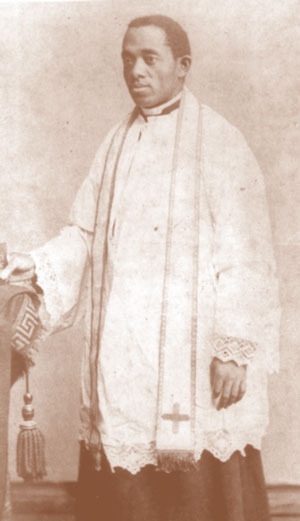
Born into slavery and ordained just twenty-one years after the end of the American Civil War, Augustine Tolton opened doors for others, even as many doors were closed to him. And people of both races did come in. They knelt side by side at Mass, drawn by Fr. Tolton’s cogent preaching, resonant singing, and kind concern.
Yes, some people came because they wanted to see for themselves the first black American priest in the United States. But many remained because they encountered Christ in him.
“Never Forget.” The baptismal records at St. Peter’s Church in Brush Creek, Missouri, list “a colored child born April 1, 1854. Son of Peter Tolton and Martha Chisley. Property of Stephen Eliot.” No name is given; both Augustine and Augustus seem to have been used.
The Toltons’ owners were Catholics, but this hardly spared the family the cruelties of slavery. By the age of seven, Augustine and his eight year-old brother, Charley, already had lash marks from the overseer in their master’s grain fields.
When the Civil War began in 1861, Peter escaped to join the Union army, hoping to win freedom and a better life for his family. He promised to come back for them, but died of dysentery in a St. Louis hospital.
Martha Jane made her own courageous escape, slipping away from the slave quarters with her two young sons and twenty-month-old daughter. Traveling by night and blending in with field slaves during the day, they made it to the Mississippi River at Hannibal, where Confederate soldiers spotted them. Martha Jane had never rowed a boat before, but she managed to get her children to the Illinois shore amid a rain of bullets.
They landed, weeping and trembling, and knelt to give thanks. “Now you are free,” she said. “Never, never forget the goodness of the Lord.”
Friends and Foes. Quincy, Illinois, where the Toltons began their new life, was a river city of twenty-five thousand. Three hundred African-Americans lived there—no longer slaves, but still segregated and often attacked when they crossed into the white section.
Mother and sons were soon working long hours at the Harris Tobacco Factory. After Charley’s death from pneumonia at age ten, Augustine labored on. But Martha Jane had higher hopes for her children. Herself illiterate, she taught them what she could—the Ten Commandments, prayers, and hymns—and looked for a way to send them to school during the three winter months when the factory was closed.
She found it at St. Boniface, a German parish, where the Toltons sat in a corner with other black Catholics. Augustine liked hearing Fr. Herman Schaeffermeyer preaching in German, as well as English, and soon became fluent in the language. He loved to act out gospel stories for his playmates, taking all the roles himself.
Seeing the boy’s potential, Fr. Schaeffermeyer gladly enrolled Augustine in the parish school, but white parents reacted in a storm of fury. Martha Jane quietly withdrew her son, and the family began attending St. Peter’s Church instead. The Irish pastor, Fr. Peter McGirr, welcomed them and took steps to ensure that Augustine would do well in his parish school. Carefully prepared by the sisters who taught there, the students at St. Peter’s welcomed their new classmate. When white parishioners protested, Fr. McGirr turned a deaf ear.
A Song in His Heart. A good student, Augustine was also growing in love of God. He became an altar boy and made his First Communion at the age of sixteen. That’s when he heard God inviting him to become a priest. Fr. McGirr and Fr. Schaeffermeyer encouraged his vocation, but no seminary in the country would accept a black candidate. “We are not ready for Negroes,” they all said. Disappointed, Augustine continued studying with local priests.
He continued at the factory and became the church custodian, often singing as he worked. To provide for his mother and sister and to save for future studies, he cleaned a saloon, made saddles, and bottled soda.
Augustine also started a Sunday school for black children and enlisted one of his former teachers to open a one-room school for them during the week. He not only rounded up children for religion classes but visited their homes and pursued their parents into taverns. He dearly wanted to minister to these people sacramentally. “If I were a priest,” he often told his mother, “I could bring them forgiveness and grace and strength.”
Thanks to the tireless efforts of the various priests who had befriended him, Augustine finally saw his dream come true. In 1880, he began studies at Rome’s Pontifical Urban University. There, among seminarians of many races and nationalities, he felt free from prejudice and discrimination. “All were my friends,” Augustine commented later. And indeed, professors and classmates appreciated “Gus” for his diligence and goodness, his beautiful singing and accordion playing.
Drinking the Cup. Augustine’s ordination took place in Rome’s Basilica of St. John Lateran on April 24, 1886. It was the thrill of his life. But he didn’t feel much like singing when he learned that his superiors were sending him to become pastor of St. Joseph’s, the parish that had evolved from his Sunday school in Quincy.
Expecting to do missionary work in Africa, Augustine had learned all he could about the continent, even one of its tribal languages. Returning to the U.S., where he would once again face racial hatred, was a hard test of faith. But he accepted it, pouring out his heart to Jesus in the seminary chapel: Yes, Lord, I can drink the cup with you.
Under Fr. Tolton’s leadership, St. Joseph’s flourished at first. There were challenges, for Quincy’s black Catholics lacked both financial resources and a stable family life. But the church was crowded every Sunday.
White Catholics stood in line at Fr. Tolton’s confessional and found him sympathetic in difficult situations, like that of a young society woman whose wedding no other parish priest would witness for fear of offending her disgruntled parents. Fr. Augustine deeply appreciated his white supporters, but their praise and generous donations aroused the hostility of an influential local pastor, who openly called Augustine “the nigger priest.”
Out of charity and fear of harming the church’s outreach to blacks, Fr. Tolton never revealed the full scope of this persecution. In the end, the jealous pastor prevailed on his bishop to forbid Fr. Augustine from ministering to whites. “Fr. Augustine Tolton is a good priest,” the bishop admitted. “However, he wants to establish a type of society here which is not feasible in this place.”
A Saint in the Slums. As his Quincy congregation shrank, Fr. Tolton explored other options. In December 1889, he received permission to move to Chicago to pastor the city’s nine hundred African-American Catholics. “Mother Tolton” and his sister Anne eventually joined him, as did nineteen converts from Quincy.
Seven years earlier, a parish had been organized for black Catholics unwelcome in other Chicago parishes. A tiny congregation, it had no pastor, no funds, and no church building. Once Augustine took over, the parish grew. Parishioners began constructing a church. But again, there was no happy ending. Lack of funds halted the work after two years; a temporary roof was put on so that Mass could be celebrated, but St. Monica’s was never completed. Discouraged, Fr. Augustine sought consolation, as always, before the Blessed Sacrament.
His prayer life sustained him as he visited parishioners in their rat-infested shacks and tenements, cheerfully tending to their spiritual and material needs. People remarked on his closeness to God. A priest who spent six weeks in Fr. Tolton’s rectory called his stay “a sacred experience.” A woman from a Catholic aid society testified: “We who come in contact with him in our labors and are witnesses of his ardent charity and self-denying zeal, feel ourselves privileged to bow the knee for his saintly blessing.”
“A Great Work.” Impelled by love and by the pressing needs around him, Fr. Tolton kept on. To Mother Katherine Drexel, who provided some financial help, he wrote:
Just last Sunday night I was called to the deathbed of a colored woman who had been away from her duties for nine years because she was hurled out of a white church and even cursed… . Even Protestants, when sick, will send for me in preference to their preachers, and they treat me with the greatest respect… . That makes me feel that there is a great work for me here.
But Fr. Augustine did not have long to carry out this work. Before many years had passed, parishioners noticed that his health had become precarious. The years of poverty and hard work were taking their toll. He developed a persistent cough, often broke out in a sweat, and sometimes had to sit down in the middle of Mass.
Walking home from the train station after a retreat on July 9, 1897, Fr. Tolton collapsed on the sidewalk. Only forty-three years old, he died in the hospital that evening.
During his eleven years as a priest, Fr. Augustine touched more people than he knew. People of all races and classes flocked to St. Monica’s to pay their respects. Thousands filed through the church, remembering what a journal had called his “fine educational training … oratorical ability … rich and full voice … whole-souled earnestness,” and his kindness to Today, the priest who opened his church doors to blacks and whites alike is on his way to being officially recognized as a pastor for all people. His cause for canonization was formally introduced in February 2011. the city’s lost and needy. In Quincy, too, where his body was brought for burial, the crowd of mourners couldn’t squeeze into the church.
All God’s Children. Today, the priest who opened his church doors to blacks and whites alike is on his way to being officially recognized as a pastor for all people. His cause for canonization was formally introduced in February 2011.
Fr. Tolton’s life asks us some challenging questions. Can we make room in our own parishes for people who seem different from us? Can we make room in our homes and in our hearts for people who speak a different language? Whose skin is a different color? Who suffer from a disability? Who come from a different culture?
Open the doors, Fr. Tolton would say. Let God widen your hearts.


